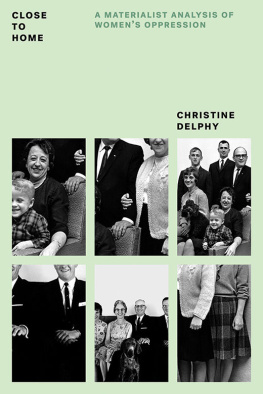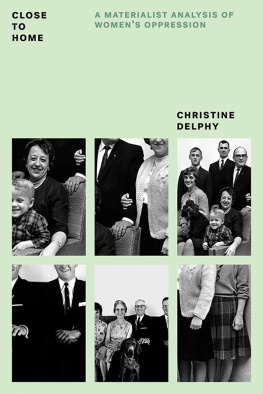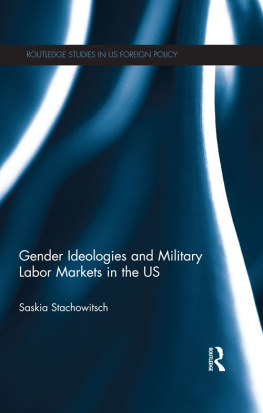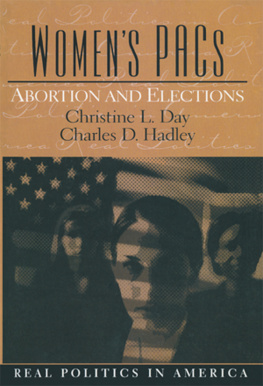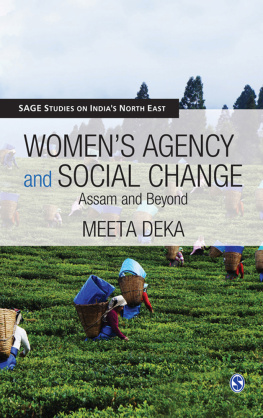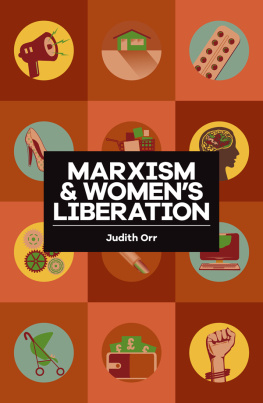First published in the English language by the University of Massachusetts Press 1984
Growing up in suburban Sydney, dinner at my house always followed a familiar pattern. My fathers plate would be the biggest, stacked high with meat, peas and potatoes. My own serving would be substantial not as large as my fathers, but enough to keep me sated until the morning. Far sparser would be the food on the plate of my younger sister (a notoriously fussy eater), or that of my mother, whose self-distributed portions tended to be dizzyingly small. There are a number of possible explanations for this state of affairs. My father is six foot two; my mother, five foot four. Perhaps the portions of food on our plates were just a reflection of how much each of us wanted or needed to eat after all, my plate was never short.
But reading Christine Delphys ground-breaking essay collection Close to Home, it occurred to me for the first time that there might have been something else at play. That my own servings aside, our pattern of consumption mirrored one that has proliferated across the globe and throughout history, in which men are systematically given more and better food to eat than women.
In Sharing the Same Table, the books third essay, Delphy examines the eating habits of French rural farming families in the 1960s and 1970s: chosen in part because all members of these households engage in hard physical labour (thereby challenging the assumption that men need to eat more because they expend more energy), and because resources in these families are typically limited, meaning that any differences in consumption arent just a matter of individuals getting more or less of what is already a surplus but of individuals getting more or less than the minimum needed for a healthy life.
Differences in time and location aside, many of these stories will feel startlingly familiar to the modern reader. There is the wife who would make herself snacks to eat in secret, then quickly hide them from view if an unexpected visitor arrived. The ageing aunt who ate the parts of the pat that had been rejected by her nephew and his out of town guests the obligation to leave the best part to the others internalised as a moral imperative. The Parisian woman who, during a shortage that pushed up the price of potatoes, told a radio interviewer that she would continue purchasing the vegetable for her husband to eat, but that she and the children would switch to rice.
These differentials in consumption dont just reflect differences in size or appetite, Delphy argues, but differences in status. In the peasant families, it wasnt just men who ate more than women, but adults who ate more than children or teenagers, the young who ate more than the old, and eldest sons who ate more than their brothers or sisters irrespective of how big or small each person was, or of how hard they worked.
Hierarchies of what and how much each was allowed to eat were acutely regulated, held in place by aphorisms such as jam spoils childrens teeth (but not the teeth of adults), wine gives men strength (but destroys womens virtue), and other deeply held beliefs about mens and womens appetites. As Delphy observes, in a comment on the aunts self-limiting to the fattiest parts of the pate, There is absolutely no need for [womens] sacrifice to be liked: it becomes second nature. The mistress of the house takes the smallest steak without thinking, and will not take one at all if by chance there are not enough for everyone. She will say I dont want any; and nobody is surprised, she least of all, that it should always be the same person who doesnt want any.
These kinds of close observations about how the mechanics of gender inequities play out in everyday life are a staple of feminist literature, from Simone de Beauvoirs The Second Sex to Betty Friedans The Feminine Mystique. But Delphys project is more than just descriptive. Over the course of the essays in this collection, she lays out a radical analysis of womens oppression that finds its roots not in biology (women as the bearers of children) or in cultural mythology (a society that values qualities associated with men over those associated with women), but in the material relations of production specifically, the relations of production as they exist within the family.
Just as the working class are exploited by capital, which profits from their labour and sets the terms of how and where they are able to work (and how much they will be paid for that work), Delphy argues that womens subordination is rooted in their economic exploitation by men, who benefit from the unpaid labour that women disproportionately provide in the home cooking, cleaning, and caring for children and older family members.
The work women do within the family is not unwaged because it inherently lacks economic value, or because the associated tasks are too intimate or important to ethically enlist to someone outside the family. In the absence of someone to do them for free, all of the tasks associated with womens household labour are available to purchase in the marketplace in the form of restaurants, childcare centres or household cleaners, a personal assistant, a bookkeeper or a party planner. Rather, it is unremunerated because of the relationship in which it is performed: specifically, marriage. As Delphy puts it, marriage is the institution by which unpaid work is extorted from a particular category of the population, women-wives.
When a woman becomes a wife, Delphy argues, her labour power is appropriated by and becomes the property of her husband. Historically, this occurred in a very literal sense. In France, a married womans wages were automatically paid to her husband until 1907; until 1965, a husband held the legal right to prevent his wife from working outside the home, keeping her financially dependent on him and ensuring that her labour was directed toward the tasks from which he benefited most. In small businesses and farming families, taking on a wife was seen as a low-cost alternative to hiring an employee. Delphy quotes the mother of one unmarried French farmer, who bemoaned, Michel needs someone to help him and he cant find a servant. If only he could get married If only, indeed.

